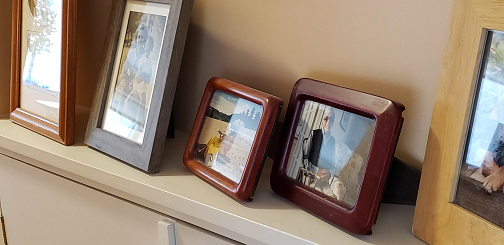Last Updated on March 25, 2023
Does the brightness and warmth from her own light outshine a mirrored glow from the accomplishments of others?
Josephine Smith was my next-door neighbor. We met during the first April in my new home. Spring had arrived suddenly on a balmy breath just days after the last bite of a cold winter. From my windows, I had previously seen her only on garbage collection days, bending sturdily into the wind, carrying a solitary bag to the curb. I had guessed she lived alone.
On the day we met, she was raking old autumn leaves out of her backyard garden. She looked up as I approached to introduce myself.
“Well hi,” she smiled, “my name is Josephine, but call me Jo – you know – like in Little Women.” We chatted for a few minutes about the nice weather, but she resumed her raking before we could begin exchanging the why’s and wherefore’s of our respective lives.
Jo’s expertise in her garden was apparent even though her tasks were simply clean-out and clean-up. She purposefully pulled weeds, quickly trimmed old growth, thoughtfully thinned flower beds. Watching her, I recalled a brochure included in my new-neighbor welcome kit: “Showcase Your Property On The Annual Waverly Way Home And Garden Tour.” Surely Jo’s property would be listed in the next tour.
As the weather warmed, so did my friendship with Jo. We spent most of our time together in backyard, over-the-fence talk. I learned that she had moved to Maryland from West Virginia in the 1940’s when she was 12. Her dad had come to Baltimore to work at Bethlehem Steel. He saved his money and eventually bought this house on Waverly Way. It was in Wheeling, West Virginia that Jo had learned how to grow vegetables and flowers. She told me that as a child, she was responsible for the family’s “kitchen garden” as she called it.
“Well,” I said, “with this beautiful backyard of yours, I bet you’re featured on the annual neighborhood tour.”
“No…I don’t think so. This is not that big a deal.” I was surprised that she undervalued her work and lacked any interest in showing it off. To Jo, gardening seemed more a continuation of family duty rather than a source of personal pleasure or pride. Maintaining her garden was a necessary chore – like dusting her dining room furniture – not a cultivation of beauty or a noteworthy accomplishment.
I guessed Jo was in her mid-fifties. She was tall but slightly stooped. Her denim shorts revealed long, shapely legs, and her t-shirts, a big bosom. Both her hair style and her clothes were simple and conservative. She never mentioned a husband or children.
She was employed part-time in a cardiologist’s office, but she was vague about her precise role. The information she shared was scant, although she spoke knowledgeably about heart disease and pacemakers and by-pass surgery. I assumed she was a nurse, and I think my assumption was alright with her. She didn’t correct it when I occasionally sought her opinion or advice on issues of health. She deftly avoided references to her training as a nurse, and so I didn’t pursue the question. However, I found her mispronunciations of medical terminology curious (like “onacology” and “chloresterol”).
Jo was her most animated and forthcoming self when anticipating a date with friends to see local theater productions. These friends were generous financial supporters of community arts. Some of them were amateur actors whom she would mention by first name as if they were close associates or even known by me. (“Ken is playing King Lear.” “Judy is auditioning for Mame.”) I was impressed by her enthusiasm and apparent intimacy with the world of live drama and music. Jo’s friend Charlotte, who was well-connected in these circles, would pull up an hour before a performance and honk for Jo. Charlotte and I would wave to each other. I never saw Jo’s other theater friends.
Jo showed similar excitement when she had plans for Saturday lunch with her old friend May. May used to live on Waverly Way before moving to one of the city’s elegant historic districts. Like Charlotte, May also had significant community connections, this time in the realm of local politics. May’s long-time boyfriend Frank had begun his career in public service as treasurer, then president of his neighborhood association. He gradually became a familiar face in his district and then made a successful run for the City Council. It was widely speculated that he would be a likely and popular candidate for mayor. During these years, May was always visible as Frank’s attractive companion at public events and press conferences, although they were not married. All along, Jo had remained in close touch with May, thereby following the milestones of Frank’s political ascent.
Again, during our backyard conversations, Jo would refer to many political players by their first names, indicating an impressive degree of familiarity with the inner workings of City government. (“If Eric loses the primary in the Ninth District, Sandra will have to go up against George Parker, and she won’t stand a chance.

I’m just praying that Eric will win.”) I had not imagined that Jo would be so politically savvy and well-informed, but most of the time I did not know who she was talking about. (“Eric who?” I wanted to ask. “And who’s Sandra?”) But I did not interrupt her.
I caught a glimpse of May visiting Jo just a few times. Once, she was delivering a large box that I later realized contained a supply of political flyers that Jo had agreed to deliver door-to-door throughout our community.
That autumn, after my son began the new school year, Jo would occasionally call me on her days off and invite me for tea, instructing me to just walk in whenever I was ready. I would arrive to find Jo sitting in her living room, knitting.
“Oooo…what are you making?” But she always deflected the attention, discreetly dropping her project into a large basket beside her chair.
“Oh, it’s nothing. Just something to pass the time, keep my hands busy.”

Over time, my curiosity grew, and my questions persisted until she finally agreed to show me all the beautiful articles she had created: sweaters in all sizes and colors, scarves, hats, even socks with multiple pairs of knitting needles in use simultaneously. I was overcome with admiration for her creativity and respect for her skill.
“Wow! I didn’t know you could do this!” Jo minimized her efforts and only reluctantly accepted my compliments.
Every time I visited Jo that winter and saw more of her handiwork, I wondered what her purpose was. Were these Christmas presents? Shower gifts? Did she plan to sell them? She admitted that, in fact, she hadn’t decided to do anything in particular with them. She didn’t value them very highly.
“Really? But Jo, these are exquisite, and there are so many things you could do with them. You can’t just let them keep
piling up.” I was happy when she agreed to talk over some ideas with me. Most of all, she liked the idea of donating them. We sipped our tea that afternoon with great satisfaction.
Jo decided to donate the soft pastel infant caps to the neo-natal clinic at the hospital where her cardiologist/employer was on staff. The huge variety of sweaters, hats, and socks for men and women, boys and girls would be donated to the local theater for their upcoming silent auction fundraiser. And she would give the stunning shawl, knitted in a lacy pattern out of fine ecru ribbon, to her best friend May. Jo appeared to be tired but relieved to finally have these decisions made. I gladly offered to help her by transporting the boxed donations to the post office. Over the next week, Jo packed, labeled, and delivered six boxes to my house.
That Saturday, I had just loaded the last box into my van when Charlotte pulled up. She and Jo had tickets to a matinee. I waved to her before stepping back inside my house. Ten minutes later, however, Charlotte was knocking and yelling loudly. Jo was expecting her arrival but was not opening the door. I dialed Jo’s phone number but got no answer. Charlotte and I did not voice our growing concerns. I grabbed the “emergency” key that Jo had given me, and we ran across the lawn. We found Jo, wearing her bathrobe, slumped in her chair in the living room, knitting needles in her hands, a ball of yarn on the floor.
A neighbor across the street saw the ambulance and came rushing to Jo’s house. The paramedics could not detect Jo’s pulse nor heartbeat nor blood pressure. They sped away with Jo, leaving us standing there, shocked and wanting to believe that she could be revived but knowing that she had probably passed earlier in the day. The neighbor from across the street said she would call May, whom she had known for years.
Keeping my promise to Jo, I reached the post office before it closed that same afternoon and mailed the boxes.
At Jo’s funeral service, I talked with the three recipients of Jo’s donations. Her co-workers were astonished to know that Jo had knitted the sweet little infant caps. The cardiologist’s nurse commented that finding a billing clerk as competent as Jo was going to be difficult. Charlotte and her theater friends, having no clue about Jo’s skill and creative ability, were shocked to receive her incomparable donation for their fundraiser. And May, who did know about Jo’s knitting talent, had already planned to wear the lovely shawl at Frank’s inauguration party as Mayor of Baltimore.
That summer, while Jo’s house was on the market to be sold, I devoted myself to sprucing up her lush backyard which was not only listed on the annual garden tour, but also won first prize.
~Julie Helms~
